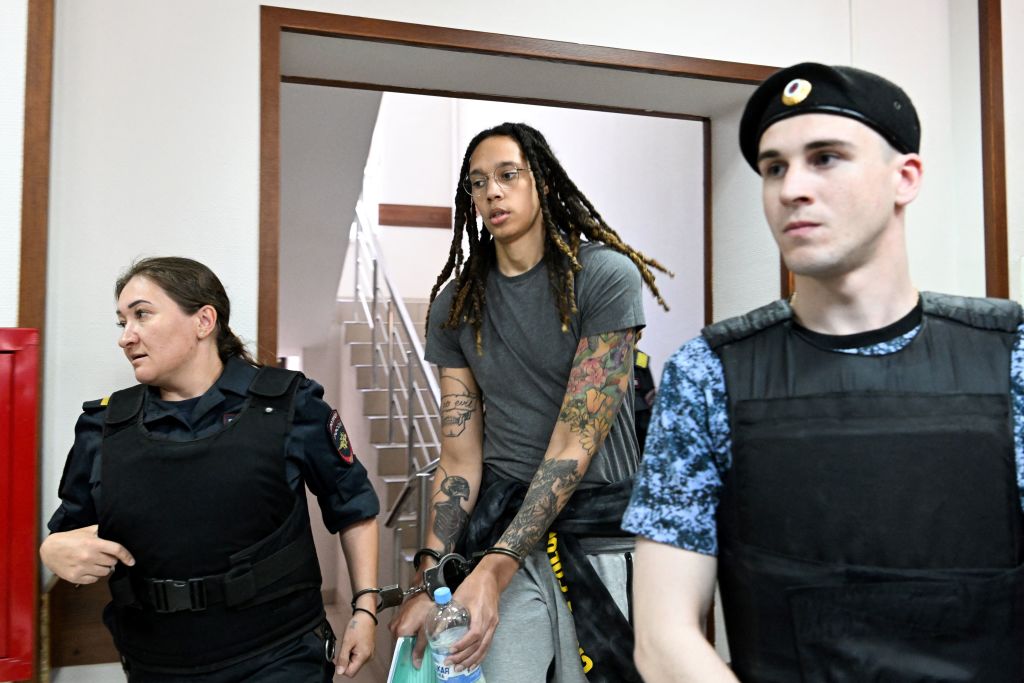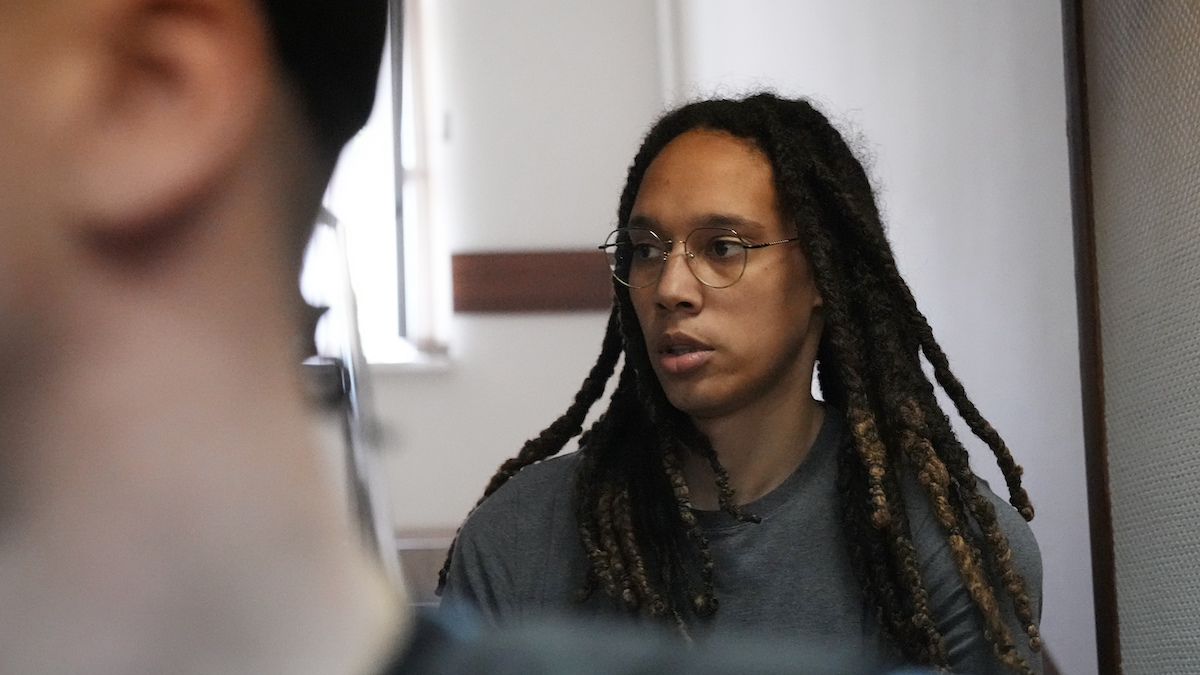American basketball star Brittney Griner pleaded guilty Thursday to drug possession charges on the second day of her trial in a Russian court in a case that could see her sentenced to up to 10 years in prison.
The abrupt guilty plea by the Phoenix Mercury star and two-time Olympic gold medalist came amid a growing chorus of calls for Washington to do more to secure her freedom nearly five months after her arrest amid rising tensions between the United States and Russia over Ukraine.
A senior Russian diplomat said earlier that no action could be taken by Moscow on Griner’s case until the trial was over, and her guilty plea could be an effort by her and her advisers to expedite the court proceedings.
Griner, 31, was detained in February at Moscow’s Sheremetyevo Airport while returning to play basketball in Russia, and police said they found vape canisters containing cannabis oil in her luggage.
Get Tri-state area news delivered to your inbox. Sign up for NBC New York's News Headlines newsletter.
Speaking through an interpreter, Griner told the court that she had no intention of committing a crime and had acted unintentionally because she had packed for Moscow in a hurry. The trial was then adjourned until July 14.
Griner emphasized “that she had committed this act through negligence, unintentionally,” her lawyer, Maria Blagovolina, told reporters outside the court near Moscow after the guilty plea.
“We of course hope for the leniency of the court,” Blagovolina said. "Considering all the circumstances of the case, taking into account the personality of our client, we believe that the admission of guilt should certainly be taken into account.”
She added that other defense witnesses would be questioned at a later session.
More Brittney Griner Coverage:
Griner's other lawyer, Alexander Boikov, said she admitted that the canister "was hers, but she said that it was unintentionally brought to to Russia, because she was in in a hurry as she was packing and it was just by accident it ended up in her luggage.”
Griner was escorted to the courtroom in handcuffs and clad in a bright red T-shirt with the name “Crenshaw” and sweat pants. She also held a photo of her wife, Cherelle.
Elizabeth Rood, deputy chief of mission at the U.S. Embassy in Moscow, told reporters after the hearing that she spoke to Griner in the courtroom and shared a letter from President Joe Biden that she read.
“She’s eating well, she’s able to read books and under the circumstances she’s doing well,” Rood said of Griner.
“I would like again to emphasize the commitment of the U.S. government at the very highest level to bring home safely Ms. Griner and all U.S. citizens wrongfully detained as well as the commitment of the U.S. Embassy in Moscow to care for and protect the interests of all U.S. citizens detained or imprisoned in Russia,” Rood said.
The White House said Biden called Griner’s wife on Wednesday to assure her that he’s doing all he can to obtain the athlete’s release, as soon as possible. They spoke after Biden read a letter from Griner in which she said she feared she’d never return home.
Washington hasn’t made public its strategy in the case and the United States may have little leverage with Moscow because of strong animosity due to Russia’s military actions in Ukraine. The State Department has designated Griner as wrongfully detained, moving her case under the supervision of its special presidential envoy for hostage affairs, effectively the government’s chief hostage negotiator.
Russian Deputy Foreign Minister Sergei Ryabkov bristled at the U.S. description of Briner as “wrongfully detained” and warned that “attempts by the American side to make noise in public ... don’t help the practical settlement of issues.”
Asked about the possibility of Griner being swapped for a Russian jailed in the U.S., Ryabkov, noted that until her trial is over “there are no formal or procedural reasons to talk about any further steps.”
He warned that U.S. criticism, including dismissive comments about the Russian judicial system, “makes it difficult to engage in detailed discussion of any possible exchanges.”
Griner's trial was adjourned after its start last week because two scheduled witnesses did not appear. Such delays are routine in Russian courts and her detention has been authorized through Dec. 20, suggesting the proceedings could last months.
Although Griner's supporters initially kept a low profile, calls for the United States to take action spiked after the trial's first day.
The Rev. Al Sharpton, one of America's most prominent Black activists, this week called for Biden to arrange a prayer meeting with Griner, saying, "Four months is too long for this to have gone on, and I hope the President acts on her pleas to come home.”
An organization called Win With Black Women sent Biden a letter saying Secretary of State Antony Blinken “has called Cherelle Griner, Brittney’s wife, assuring her and stating publicly that Brittney’s safe return was a matter of personal priority; however, we are concerned that the rhetoric does not appear to align with the actions taken to date. We urge you to make a deal to get Brittney back home swiftly.”
Russian news media have repeatedly speculated that Griner could be swapped for Russian arms trader Viktor Bout, nicknamed “the Merchant of Death,” who is serving a 25-year sentence in the U.S. on conviction of conspiracy to kill U.S. citizens and providing aid to a terrorist organization.
Russia has agitated for Bout’s release for years. But the wide discrepancy between Griner’s alleged offense and Bout’s global dealings in deadly weapons could make such a swap unpalatable to Washington.
Others have suggested that she could be traded along with Paul Whelan, a former Marine and security director serving a 16-year sentence in Russia on an espionage conviction that the U.S. has repeatedly described as a setup.
Russia has shown no signs of backing off.
“This is a serious offense, confirmed by indisputable evidence ... Attempts to present the case as if the American was detained illegally do not hold up," Foreign Ministry spokesman Alexei Zaitsev said Wednesday.
“The law has been violated, and arguments about the innocent nature of Griner’s addiction, which, by the way, is punishable in some U.S. states, are inappropriate in this case,” he said.



